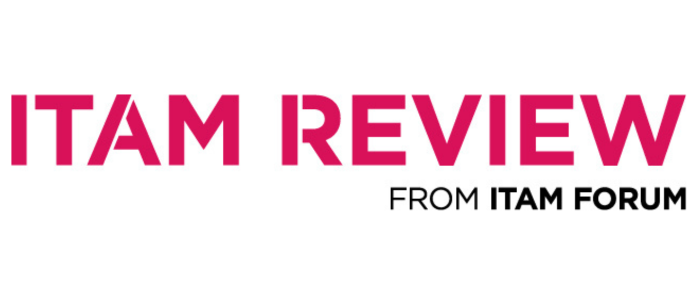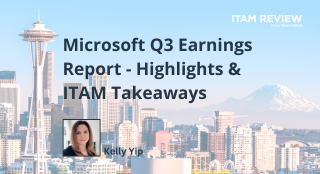IBM auditors target compliance revenue per customer - Three strategies to tackle IBM software waste head-on

IBM audits are being used to prop up license revenue targets – not to protect IP
One striking trend we see in modern audit activity is that software audits are NOT about reducing non-compliance.
It is right and proper that a company should protect their intellectual property and prevent exploitation.
But it is clear from research with the Campaign for Clear Licensing (CCL) that software publishers are abusing IP protection law to their financial and market advantage.
In studies into the behaviour of IBM, Oracle, SAP and Microsoft over the last two years, not one person has mentioned reducing compliance as a goal.
Not one software publisher has stated “Thanks to SAM evangelism, audits and education we have reduced non-compliance from 20% to 18%”. For old-school software companies modern audits are all money, collecting data to drive the next deal and pushing product on customers.
IBM auditors such as Deloitte target revenue per customer and ROI, rather than reducing non-compliance. Audits are big business, a quarter of IBM software revenue is said to be generated by software auditors.
Learn how to address these issues head-on at our IBM Cost Optimization seminar on the 4th November:
https://itassetmanagement.net/event/uk-ibm-cost-optimization-seminar/
In addition to the revenue focus taking precedence over resolving compliance, The Campaign for Clear Licensing found five other key themes with IBM licensing and audit behaviour:
- IBM customers struggle with inconsistencies across different terms and conditions for different products.
- IBM are very poor at communications, IBM’s audits typically know more about IBM Licensing than IBM – and have no vested interest in educating the customer or the market as a whole.
- Many customers cited audit behaviour from KPMG as unprofessional or without sufficient data quality or expertise.
- Unlike Oracle, IBM allows sub-capacity of virtual infrastructure, but customers were struggling to realize its real value.
- Customers struggle with trying to unpick IBM bundling to ensure compliance
Tackling IBM Waste Head-On
We recommend that IBM customers use three strategies to tackle software waste head-on with three strategies:
- Reduce your license requirement, fully exploit what you have
- Reduce future support costs, cut out unnecessary costs whilst maintaining service
- Buy smart – if shortfalls exist, buy them on the secondary market. Similarly sell any surplus licenses on the secondary market and add revenue directly to your IT budget.
1. Reduce your license requirement
IBM licensing is complex. Customers need to either train up internal teams or hire external expertise. Whilst the process is not easy, the returns are significant.
Eric Chiu says:
“Maintaining licence compliance for IBM is known to be a highly challenging task. Based on IBM’s publicly available software catalogue, the company licenses its software using over 120 different licence metrics, and only 1 metric (Processor Value Unit) can be tracked with the help with automated tools. According to Passport Advantage agreement, IBM’s most popular EULA, “for all non PVU based licenses, Client is required to manually manage and track Client’s licenses”.
To make the matter worse, the techniques of manually tracking licences, such as running certain queries to identify user access roles,are not publicly accessible.”
2. Reduce future support costs
The market for secondary software suppliers is expanding; IBM customers should actively explore this as an option for reducing support on legacy IBM investments. The recent Rimini Street vs. Oracle verdict is great news for business software users who have felt trapped by the big software publishers like Oracle and IBM.
According to Origina CEO & Founder, Tomas O’Leary:
“The award of damages of $50million was a mere fraction of what Oracle was seeking. Oracle’s clear intent was to break a third party maintainer but it failed. What was never disputed was the legality of third party maintenance, if done properly. Oracle have publicly expressed that the Rimini Street case is not intended as a broad assault on third party support and companies like Origina are dedicated to reducing substantially the costs of software maintenance for licensees of software.
The settlement of this case should embolden CIO’s to look again at what independent software maintenance can do for their enterprises. It is widely known that CIO’s are desperate to reduce the amount they pay in maintenance to the big software publishers, which they regard as over-priced for the value it delivers. Independent maintenance offers an option that is not merely a valuable negotiating tool but it can also be an enabler of innovation, by freeing up budgets that you could be better used elsewhere.
We hope that the doubters in large companies will realise that they have nothing to fear from software licensors when considering whether to transfer their software maintenance to independent companies” according to O’Leary. “The ebb tide is turning in favour of a rising tide favourable to independent maintainers and we are delighted to be at the vanguard of that”
3. Buy Smart – buy secondary
According to Softcorner CEO & Founder Habibou M’Baye:
“Companies can no longer ignore the opportunity offered by the secondary market.
Gartner states businesses inability to control their software spending (+ 8.5% in 2014) will have a huge impact on their ability to innovate and foster digital transformation. At the same time over 25% of software licenses acquired each year are never used.”
In July 2012 the European Union ruled against Oracle in the resale of secondary software. Since that decision a secondary market has slowly developed for the buying and selling of second hand software.
Also see: ‘Can I sell my surplus licenses?’ – For the terms of trade.
If a shortfall is discovered in your IBM estate, customers can benefit from significant discounts buy buying in the secondary market. Similarly, if surpluses exist they can also be resold to deliver financial returns directly to IT budgets.
If you are experiencing any of the issues mentioned in this article please contact the Campaign for Clear Licensing to let us know so we may raise your complaint directly with the software publishers.
Learn how to address these issues head-on at our IBM Cost Optimization seminar on the 4th November:
https://itassetmanagement.net/event/uk-ibm-cost-optimization-seminar/
Can’t find what you’re looking for?
More from ITAM News & Analysis
-
Broadcom vs Siemens AG - A Brewing Storm
The ongoing legal battle between VMware (under Broadcom ownership) and Siemens is yet another example of why ITAM goes far beyond license compliance and SAM. What might, at first glance, appear to be a licensing dispute, ... -
Shifting Left Together: Embedding ITAM into FinOps Culture
During one of the keynotes at the FinOps X conference in San Diego, JR Storment, Executive Director of the FinOps Foundation, interviewed a senior executive from Salesforce. They discussed the idea of combining the roles of ... -
Addressing the SaaS Data Gap in FinOps FOCUS 2.1
I recently reported on the FinOps Foundation’s inclusion of SaaS and Datacenter in its expanded Cloud+ scope. At that time, I highlighted concerns about getting the myriad SaaS companies to supply FOCUS-compliant billing data. A couple ...
Podcast
ITAM training
Similar Posts
-
Broadcom vs Siemens AG - A Brewing Storm
The ongoing legal battle between VMware (under Broadcom ownership) and Siemens is yet another example of why ITAM goes far beyond license compliance and SAM. What might, at first glance, appear to be a licensing dispute, ... -
Microsoft Power Apps: Current Pricing Models Comparison
Back in November 2021, Microsoft made Power Apps available under the pay-as-you-go (PAYG) model, alongside the traditional Per User/Per App options. This PAYG model has gained popularity. It ensures simple rightsizing for Power Apps environments. Here, ... -
Microsoft Q3 Soars as AI and Azure Growth Fuels Market Gains
On the 30th April, Microsoft released its Q3 quarterly earnings report, exceeding expectations and igniting investor optimism. Investors had been keeping a watchful eye on Azure’s Cloud performance after Microsoft’s Q2 Cloud results fell short of ... -
The High Cost of Oracle Java: Managing Expenses and Operational Efficiency
For businesses reliant on Java, Oracle’s licensing model presents a formidable challenge. Once a freely available technology, Java has evolved into a costly necessity for enterprises, with licensing changes leading to widespread financial and operational concerns. ...




